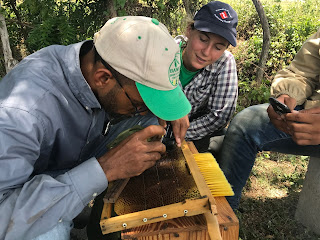Queen Bee Breeding in the DR
At the beginning of August, queen bee breeder Shaana Way traveled to the Dominican Republic to teach queen rearing to Dominican beekeepers and farmers. She consulted with ASOAPIFRODA (Asociación de Apicultores La Fronteriza de Dajabon), a bee association near the border with Haiti that collectively manages over three thousand hives, and BANELINO, an organic banana cooperative that is expanding its program to include beekeeping opportunities for banana growers. Both groups had stated interest in learning to raise queen honeybees to expand their apiaries and improve their colony sustainability.
Raising queen honeybees is a powerful tool to grow hive numbers and select for the most advantageous genetics for the beekeeper’s local climate. Other traits that can be selected include bee temperament, productivity, disease resistance, and hygienic behavior. The industry standard of queen production, called grafting, involves moving a larva from a colony the beekeeper selects and placing the larva into a special “queen cup.” This queen cup is given to a colony that is “queenless” and “broodless,” under which conditions the bees are motivated to build a new queen. Using these concepts, a beekeeper can raise a large number of queens and start many new hives.
Grafting is not the only method of raising queens. Shaana also emphasized making splits, or divides, of colonies and allowing the queenless split to “build” a new one. This process is a natural part of the honeybee life cycle and the bees are almost immediately set to work on selectively feeding the best food to their future queen. One month later, the beekeeper will know definitively if their “split” was successful or not by the presence of eggs laid by a new queen.
Although the world praises them for their honey, beekeeping involves much more than making sweet products. It takes work to raise healthy, strong colonies that produce appreciable amounts of honey. Beekeeping also provides other economic opportunities aside from honey for the beekeeper: wax, pollen, propolis, venom, and pollination services to farmers. Queen bee breeding is carving out a niche market in some parts of the world and can also generate income for beekeepers.



.png)

Comments
Post a Comment